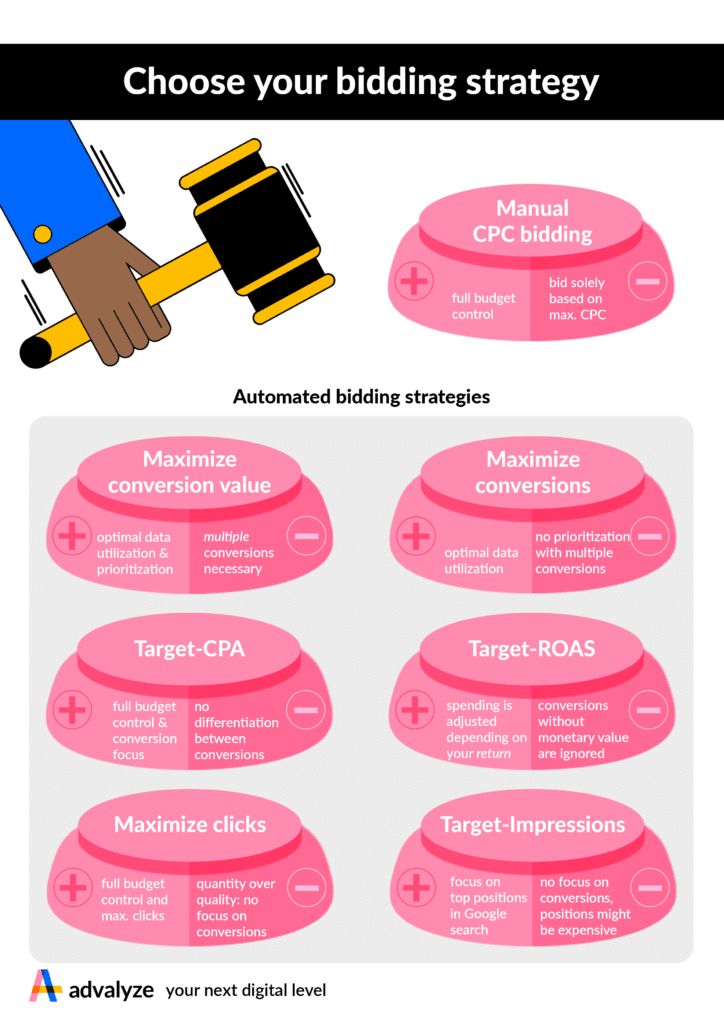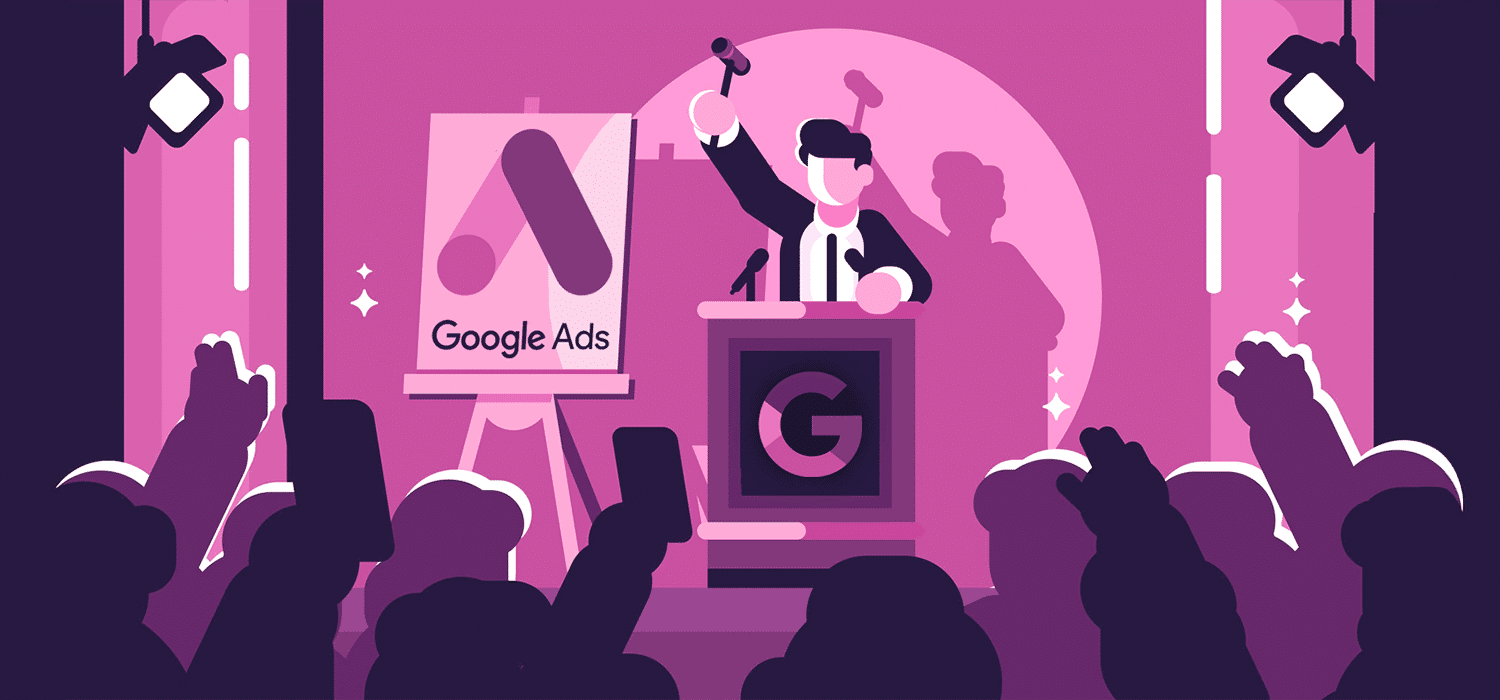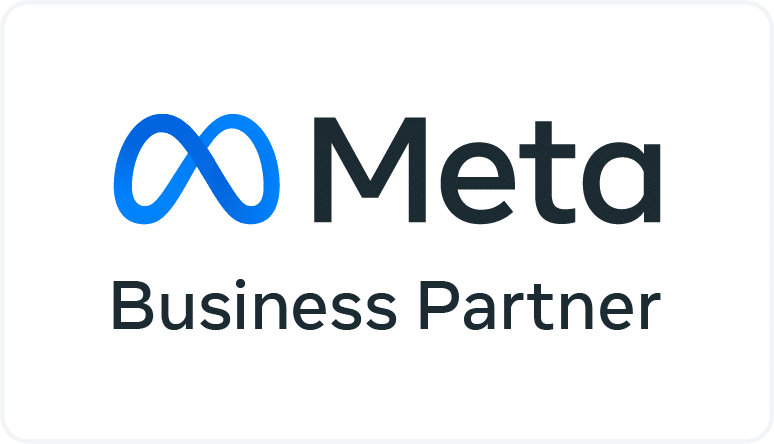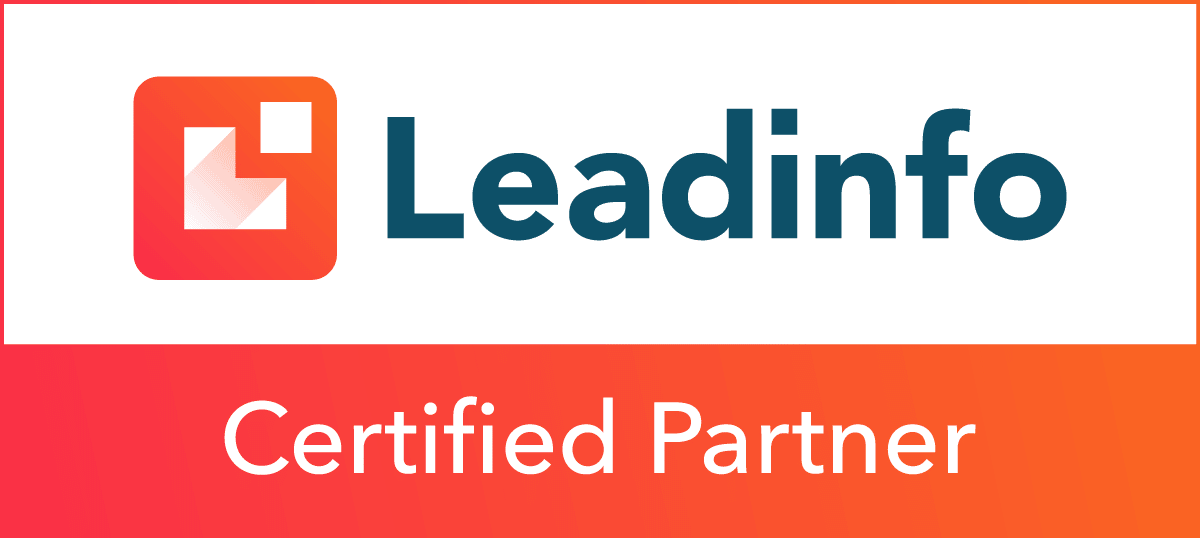Google often works like an exciting auction: the best offer wins, or – to put it directly in Google terms – you can achieve the best possible marketing results for a manageable sum by choosing the right bid strategy. The aim is always to obtain the greatest possible effect in terms of click maximization and conversion generation with the lowest possible budget. Yet bid strategies are just one piece of the jigsaw when it comes to improving your performance. For example, you can optimize the way that your managed accounts perform with the aid of the right hacks for Google Ads. You can also generate more conversions using Customer Match – or define new target groups.
But let’s do things one at a time.
Google Ads bid types
Putting it simply, bid strategies are nothing more than specific settings tailored to every type of campaign so that results can be achieved for a chosen budget. With a bid strategy, you can specify how your ad will be displayed and which goals you wish to pursue. Google generally distinguishes between two types of bids: manual bid strategies and automated strategies, also known as smart bidding. Google Ads offers you several different kinds of manual and automated bid strategies that you can use and try out, depending on what you want to focus on.
You’ll find the most important strategies at a glance below:

Manual CPC bidding on Google Ads
You set the maximum amount that you’re willing to pay for each click on your advert through a manual cost-per-click (CPC) bid. You can set the maximum value of your CPC both for your entire ad group or on a keyword‑specific basis. Your CPC will apply to your entire ad group as long as you don’t make any changes at the keyword level.
This type of bid is particularly useful for Search Network, Shopping or Display Network campaigns and it also has the benefit that you always retain full control over your costs.
It is always advisable to work with a smart bid strategy as soon as you have a specific data basis.
The downside: You’re not making the best use of the data that Google collects. This means that your bid will only be decided on the basis of your maximum CPC and not according to potential conversions.
Smart bidding: Automatic bidding strategies in Google Ads
It is always advisable to work with a smart bid strategy as soon as you have a specific data basis. Your campaign bids will be used automatically with the aid of machine learning. This will let you make optimal use of the data you have collected so that you can achieve your campaign targets. Smart bid strategies include Target CPA, Target ROAS, Conversions, and Maximize Conversion Value.
The most important smart bidding strategies in Google Ads
With smart bidding strategies, you hand over the complex calculations to Google and so reduce your own workload. These strategies will help you find the perfect balance between high turnovers and low costs.
Bid strategy 1: Maximizing the conversion value
With this bid strategy, the focus is on the sales that you generate from your campaigns. This means that your bids will be optimized based on real-time data. It calls for active conversion tracking – you’ll also have to assign different values to the conversions you’ve created. It should be noted that there is no way of controlling the maximum CPC. Moreover, you should keep an eye on the budget all the time and keep making adjustments. Otherwise, your CPCs can get out of control as the algorithm will also try to spend the daily budget you’ve set. This bid strategy is particularly recommended for e-commerce companies and campaigns with multiple conversion types.
The advantage here is that your conversions will be differentiated according to priority, and all the available data will be used for optimization. However, you will also have to define multiple conversions otherwise there will not be a sufficient basis for this strategy.
Bid strategy 2: Maximizing conversions
This automatic bid strategy is recommended if conversions of any kind are the top priority in your campaigns. Your bids will be automatically optimized during auctions so that the algorithm always decides how much to bid: The more likely a conversion is, the higher the bid will be. However, the bid will be lower if it is discovered that the search query is unlikely to generate conversions. This strategy also tries to make full use of the daily budget. So, if you want to switch to ‘optimize conversion’, you’ll first need to adjust your budget to avoid an increase in your CPC and – as a result – your expenses. This bid strategy is best suited for Search Network, Google Display Network, and Google Discovery campaigns. Moreover, please ensure that conversion tracking is enabled in your advertising account.
Let us help you with Google Ads
For one thing, this bid strategy focuses on data for optimizing your conversions, although – if you have saved multiple conversions – you will not be able to prioritize between them.
Bid strategy 3: Target CPA
With this cost-per-action bid strategy, you specify the precise amount to be paid for a selected conversion. Based on this amount, the algorithm will then try to run your campaigns to meet the CPA (Cost-Per-Action) specified at the campaign or ad group level. In practice, it will look like this: Some conversions may cost more than the target amount, while others may cost less. On average, however, the aim is to ensure that the specified target CPA is met. The best way to determine the amount is to analyze the data on an ongoing campaign and derive an indicative CPA. The higher the number of conversions, the more precisely you can determine the target CPA. You can use this bid strategy in every campaign, the only exception being: shopping campaigns. Furthermore, conversion tracking will also need to be activated in the Google Ads account for this strategy.
Following this strategy, you will – on the one hand – have complete control over the costs. On the other hand, however, there is no way you will be able to distinguish between the different conversions.
Bid strategy 4: Target ROAS
This smart bidding strategy focuses on optimizing your sales so that your Google Ads campaigns achieve the return on your advertising costs that you have set. This means that the algorithm will attempt to keep the ROAS (Return on Ad Spend) within the specified budget and set bids according to the target. To set the ROAS appropriately, it makes sense to first collect the necessary data by following another strategy (for example, target CPA, conversion maximization) and then to decide accordingly. The target ROAS strategy is suitable for almost all types of campaign (except video campaigns), but it does need value-based web tracking for it to be implemented.
On the one hand, you can use it to precisely adjust your expenses, which is a particular advantage in the e-commerce sector. On the other hand, the downside is that conversions with no direct monetary value are neglected.
Bid strategy 5: Maximizing clicks
This bid strategy is the right choice if you want to increase the number of visits to your website. Based on the motto of “quantity rather than quality,” this algorithm tries to generate as many clicks as possible based on the budget you have defined without specifying an exact conversion target. Your ad will ultimately be displayed for those search queries that are most likely to generate a click. This strategy is suitable both for joining a campaign to collect data for later conversion and for increasing the awareness of your brand. Campaigns in the Search Network and in the Google Display Network are particularly well-suited for this. However, you can also employ this bid strategy for standard shopping campaigns.
The advantage is that you can keep a close eye on your costs with the maximum CPC bid (this works the same as with manual CPC) and collect as many clicks as possible. However, the focus here is not on conversions because, as mentioned above, the spotlight is on quantity.
Bid strategy 6: Target impression share
If you choose to follow this automated strategy, then you’ll be aiming for a specific position – usually the top one – on the Google search results page. This means that your ads will appear either more or less frequently, depending on when, where and how people search for your brand. This strategy is best suited for brand campaigns and increasing your brand awareness. The maximum CPC bid determines the bidding cap; to achieve the desired result, you shouldn’t set your limit too low.
Ultimately, you can use this strategy to optimize your ranking in Google search and leave your competitors behind. Nevertheless, you must be aware that the focus is not on conversions and that top positions may quickly start costing a lot of money.
Can you change your bid strategy?
In general, you are free to change your bid strategy at any time. For example, this is particularly useful if you want to switch your focus from clicks to conversions. This calls for a meaningful amount of data, which you will first need to collect through your entry strategy so that you can then plan your budget based on this data. Nevertheless, it would help if you gave each campaign the time needed to “level out”. Google recommends a waiting period of at least seven days.
The important thing is that you are willing to experiment. This is the only way of getting the right feeling and finding the right bid strategies for your campaigns.
Conclusion
Depending on the targets that you want to achieve with your campaigns, Google will offer you a suitable bid strategy. Generally speaking, the automatic bidding algorithm will do a good job of simplifying your work. Nonetheless, there will be moments and exceptions when you’ll need to make decisions yourself to use your budget profitably and achieve the desired results.
If you still can’t decide which strategy is the right one for you, simply contact us by phone, email, or via our social media channels. We will be happy to help.
We are Google Ads experts







